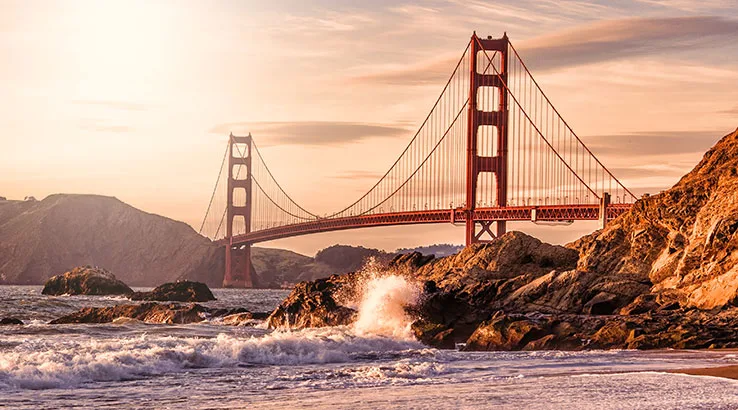What is travel insurance?
Travel insurance is designed to protect you financially if something unexpectedly happens while you’re away on your trip. For example, your luggage goes missing and you have to buy all new clothes; or if you roll your ankle while hiking and need to be taken to a hospital where the medical fees are expensive.
Travel insurance is also handy for more serious scenarios or complications you could encounter while on holiday. For example, if you seriously damage a rental car and need to pay the excess or if important documents like your passport are stolen and you need to replace it ASAP.
While we hope you never have to use it, a comprehensive travel insurance policy can be a lifesaver when your getaway doesn’t go to plan.
What does travel insurance cover?
Travel insurance covers emergencies or accidents that might happen to you or your belongings while you're away from home. You pay a travel insurer a fee (known as a premium) that is calculated based on the risks associated with your trip. In exchange, your insurer will pay you for unexpected costs related to your trip such as the following:
- Medical expenses if you're sick or injured overseas.
- Medical expenses relating to COVID-19.
- Reimbursing you if you need to cancel your trip or cut it short.
- Covering your valuables and travel documents if they get lost, stolen or damaged.
- Flight cancellations
- Lost luggage
- Rental car excess (optional extra)
Personal liability
These are just a few examples of what travel insurance can cover. To understand what you’re covered for, read the product disclosure statement (PDS) on your chosen provider’s website.
Do I need travel insurance?
It’s a question we hear often, but it's a question only you can answer. However, here are some scenarios where purchasing a travel insurance policy could be a good idea:
- If your trip is lengthy and expensive. If you’re planning a big getaway where you’ll be gone for a while, accommodation, flights, activities and everything else in between can start to add up. Travel insurance gives you peace of mind that you’ll be covered if things go wrong.
- If you’re planning on skiing or snowboarding. Planning on hitting the slopes? Many travel insurers allow you to purchase additional cover for specific activities, like skiing or snowboarding. This is often listed as Snow Cover.
- You’re going on a cruise. In addition to Snow Cover, you’ll also be able to purchase Cruise Cover. Even if your cruise isn’t leaving Australian waters, you might not be able to claim Medicare or your private health insurance, so it’s better to be safe than sorry.
- You wouldn’t be able to replace your belongings. From replacing your clothes to more valuable items, like your laptop, you might not have the funds to cover all of these if your luggage goes missing. Travel insurance can reimburse you for these items.
- You’re visiting a risky country. If you’re travelling to a risky country,travel insurance is a must. Keep in mind that if a travel warning has been issued, there’s a good chance your insurer won’t cover you.
- You’re renting a car. If you’re planning on getting around with a rental car at your destination, having a policy that offers rental car excess insurance might be worth considering.
- Domestic travel. If you are travelling within Australia, travel insurance isn’t a must. However, it still may be a good idea if you want coverage for your luggage or flights.
- Your credit card has complimentary insurance. Many credit card providers offer complimentary insurances, like travel insurance. However, coverage can be limited and you may need to follow certain criteria to activate cover.
- Your trip is short and cheap. If you’re heading off on a weekend away, you may not need travel insurance.
- Get ahead. While travel insurance technically doesn’t kick in the moment you buy it, you shouldn’t wait for till the last minute. Tick it off your to do list early to guarantee cover for things like flight cancellations or delays.
- Review limits. No insurers have the same two policies, which is why it’s important to review coverage limits across PDS’s to ensure you’re covered for the amount you need. Things like clothing, electronics and jewelry can be costly to replace and it’s better to be safe than sorry.
- Double check ski and sports cover. If you plan on engaging in adventurous activities or snow sports, double check whether the insurer offers it as an optional extra or if it’s automatically included.
- Be honest. If you have a pre-existing condition or have something your insurer needs to be aware of, state it upfront. It could mean the difference between being covered during an emergency or having to cough up thousands to manage your unforeseen disaster.
- Multi-trip insurance. Covers multiple trips during the year for up to 90 days. A multi-trip policy can be the cheaper option than purchasing a single policy each time you travel.
- Cruise travel insurance. Cruise insurance is typically listed as an optional extra for your existing policy. Even if your cruise isn’t leaving Australian waters, it’s still recommended to add on cruise cover to have cover for medical expenses.
- Ski cover. Ski cover is often listed as an optional extra for travelers and covers things like loss or damage to ski equipment, trip cancellations or unused lift passes.
- Domestic travel insurance. While it might not seem essential because of Australia’s health care system, domestic travel insurance offers coverage for things like lost luggage or flight delays.
- Senior travel insurance. Seniors should be able to take out cover for almost any insurer, though there are some that solely offer seniors travel insurance.
- Travel insurance for visitors to Australia. Also known as inbound travel insurance, these policies allow visitors to Australia to access cover for medical emergencies, trip delays or cancellations and lost or damaged luggage.
- Travel insurance for pregnancy. Coverage is available for up to 30 weeks. Pregnancy travel insurance offers standard coverage, plus coverage for pregnancy-related complications, including gestational diabetes or pre-eclampsia.
- Travel insurance for pre-existing conditions.You may be able to have your pre-existing condition automatically covered or pay an additional fee. Some conditions aren’t covered at all, so it’s important to compare policies to ensure you’ll be covered.
- Rental car excess insurance. If you’re planning on hiring a rental car overseas, rental car excess insurance is a must. This insurance covers the rental car excess charged if you are involved in an accident. Some insurers automatically cover rental car excess or you’ll need to add it as an optional extra when purchasing your policy.
-
-
-
-
-
-
-
-
-
Did you know?
Finder research revealed a worrying 2 in 3 Australians don’t take out travel insurance. 1 in 3 admitted the reason they travelled without cover was because it was too expensive. This line of thinking could seriously drain your savings if something were to go wrong while abroad.
When you might not need travel insurance
While traveling with a comprehensive travel insurance policy is generally recommended, there are circumstances where you may not need a policy, such as:
How much does travel insurance typically cost?
The cost of travel insurance varies greatly based on where you’re going, the length of your trip and how risky your planned activities are. For a domestic policy, you could be looking at anywhere between $40-$100. For an international policy, you could be up for $100-$300. These price ranges are approximate and should be used as a guide only. Your own quote will differ based on where you’re headed, the length of your trip and what level of cover you select. It’s super easy to get quotes for yourself and compare travel insurance policies, just use the form at the top of the page and you’ll see what’s available on Finder within 30 seconds.
Keep in mind, the cheapest policy isn't always the best. It’s important to know what you’re covered for.
How to compare travel insurance
One of the easiest ways to save on your travel insurance is to shop around on policies. Finder compares 15 big name insurers to help you find the right policy. Here are 4 tips to ensure you find a winner:
When should you buy travel insurance?
It’s wise to compare travel insurance and purchase a policy once you’ve booked costly items or things that can’t be refunded. That could be flights, accommodation, activities, anything really. Once you’ve got a trip firmed up, the best way to protect it is by taking out a travel insurance policy.
Compare Finder award-winning travel insurers

"Good to know – only a handful of insurers including SCTI and CoverMore can cover you for trip cancellations or changes before your journey because of an unexpected event. The majority don't do this. They only cover you for certain reasons. So for example, if your flight was cancelled or delayed for a reason not listed in the PDS, you might not be covered."




















Hi there! I am doing a long trip to USA, Canada, Bahamas, Dominican Republic, Finland, Germany, UK & Ireland but want to be away for more than 12 months. Most policies I’ve seen only cover up to 12 months. Any policies that will allow longer travel or to extend once you’re already travelling?
Hi Sophie,
Yes this is possible, you can learn more about long-term travel insurance here. Hope that helps!
HI,
Was checking my HSBC Travel Insurance on my Platinum Card and there isinsmall print under Transporation that seems to exclude CRUISES yet your info page about says that cruising IS covered under the Allianz based policy… Have i misread or do i need to buy other travel insurance… thanks
Hi Kezza, According to HSBC’s policy guide for personal cards, cruise travel is covered providing you’ve prepaid some of the costs using the card: “Cruising is covered in both Australian and International waters, where you are travelling on a foreign registered cruise ship.”
Hi
I would like to know if there is a travel insurer who covers ‘cancellation’ or ‘rescheduling’ or ‘cut short’ my trip because of the death, or illness of my relative. My father is 94 years old – I am planning to travel to NZ for 3 weeks, my elderly father lives at home in Australia and receives home support thru an aged care program. He has a number of underlying medical conditions but none are considered terminal. Thank you for your assistance with this query.
Hi Patricia,
This can be a bit tricky, because you are generally not covered for any of your relative’s medical conditions you knew about before the policy started. If an issue were to arise around a new, undiagnosed condition, you may be able to get cover. You can learn more about travel insurance that can help with the cost of getting home if a relative gets sick or dies when you’re away from home here, including an outline of which insurers may be able to offer a policy. Hope this helps!
We are taking a group to Cook Islands from Australia for 10 days
9 adults 18+yrs; 10 youth 13-17 yrs
Are there group Travel Insurers?
No hard or soft sports. Thanks.
Hi Maree,
Yes, there are many insurers who cover groups of up to 25 people. Group travel insurance offers the same benefits as a standard travel insurance policy. When purchasing a group travel insurance policy, just make sure to list all the names and ages of the people you need covered and disclose any pre-existing medical conditions as you would with a regular policy.
You can compare insurers who offer group travel insurance by checking out our Group Travel Insurance page. I hope this helps!
Ceyda
I’m looking for travel insurance which will cover trekking Mount Killimanjaro up to 6000m
Hi Per,
You will need to purchase a policy that specifically covers high-altitude trekking, as most basic policies don’t have lower or no altitude limits. Australian-based travel insurance options include Auras, Fast Cover (with an “Adventure Pack”), Freely (with an “Adventure Activities Boost”), nib and World Nomads. Hope this helps!